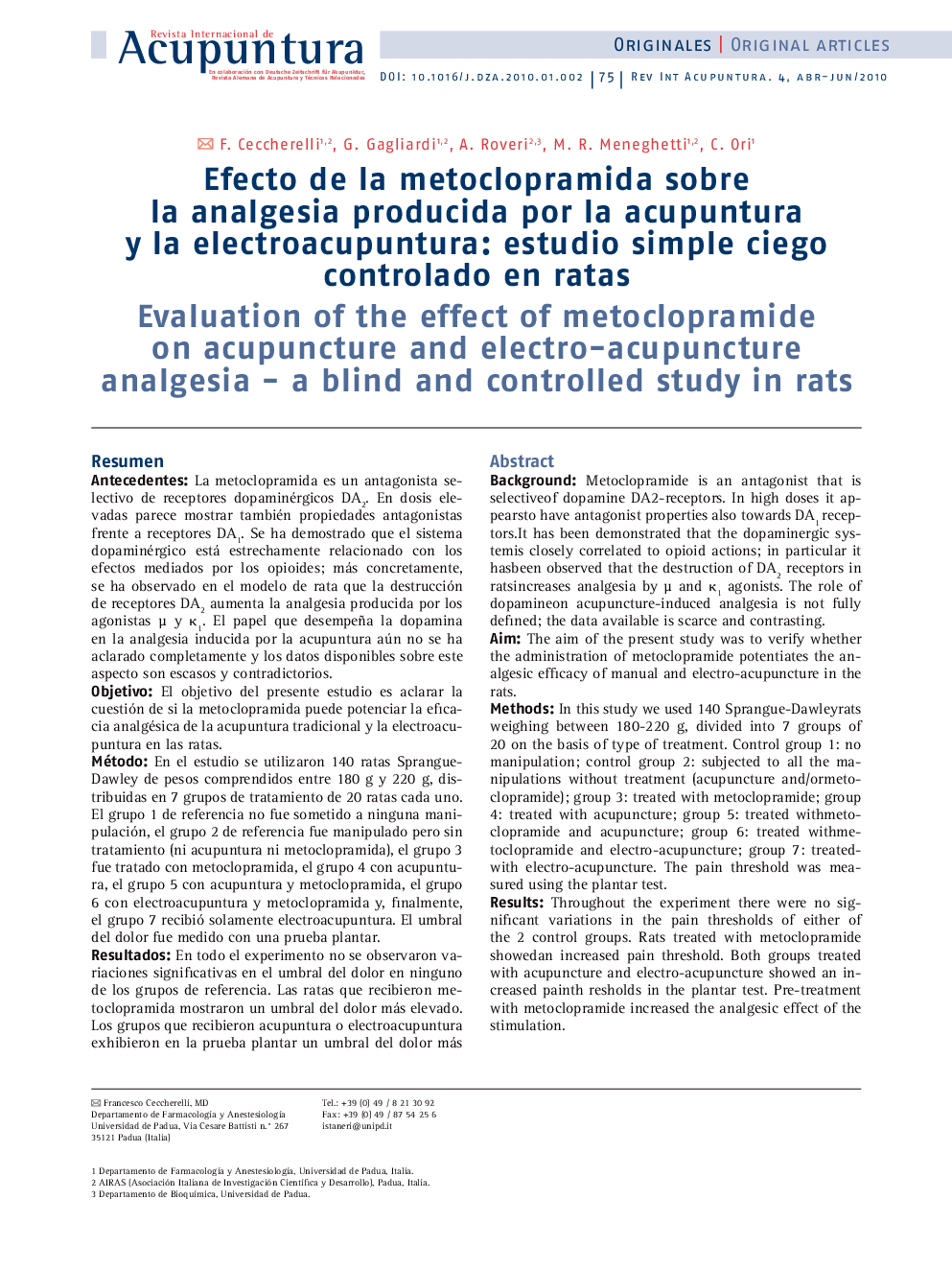| Article ID | Journal | Published Year | Pages | File Type |
|---|---|---|---|---|
| 3102507 | Revista Internacional de Acupuntura | 2010 | 6 Pages |
ResumenAntecedentesLa metoclopramida es un antagonista selectivo de receptores dopaminérgicos DA2. En dosis elevadas parece mostrar también propiedades antagonistas frente a receptores DA1. Se ha demostrado que el sistema dopaminérgico está estrechamente relacionado con los efectos mediados por los opioides; más concretamente, se ha observado en el modelo de rata que la destrucción de receptores DA2 aumenta la analgesia producida por los agonistas μ y κ1. El papel que desempeña la dopamina en la analgesia inducida por la acupuntura aún no se ha aclarado completamente y los datos disponibles sobre este aspecto son escasos y contradictorios.ObjetivoEl objetivo del presente estudio es aclarar la cuestión de si la metoclopramida puede potenciar la eficacia analgésica de la acupuntura tradicional y la electroacupuntura en las ratas.MétodoEn el estudio se utilizaron 140 ratas Sprangue-Dawley de pesos comprendidos entre 180 g y 220 g, distribuidas en 7 grupos de tratamiento de 20 ratas cada uno. El grupo 1 de referencia no fue sometido a ninguna manipulación, el grupo 2 de referencia fue manipulado pero sin tratamiento (ni acupuntura ni metoclopramida), el grupo 3 fue tratado con metoclopramida, el grupo 4 con acupuntura, el grupo 5 con acupuntura y metoclopramida, el grupo 6 con electroacupuntura y metoclopramida y, finalmente, el grupo 7 recibió solamente electroacupuntura. El umbral del dolor fue medido con una prueba plantar.ResultadosEn todo el experimento no se observaron variaciones significativas en el umbral del dolor en ninguno de los grupos de referencia. Las ratas que recibieron metoclopramida mostraron un umbral del dolor más elevado. Los grupos que recibieron acupuntura o electroacupuntura exhibieron en la prueba plantar un umbral del dolor más alto. El tratamiento previo con metoclopramida aumentó el efecto analgésico de la estimulación.ConclusionesSe pudo demostrar que la metoclopramida posee efectos analgésicos y puede potenciar el efecto analgésico de la acupuntura y la electroacupuntura.
BackgroundMetoclopramide is an antagonist that is selectiveof dopamine DA2-receptors. In high doses it appearsto have antagonist properties also towards DA1 receptors. It has been demonstrated that the dopaminergic systemis closely correlated to opioid actions; in particular it hasbeen observed that the destruction of DA2 receptors in ratsincreases analgesia by μ and κ1 agonists. The role of dopamineon acupuncture-induced analgesia is not fully defined; the data available is scarce and contrasting.AimThe aim of the present study was to verify whether the administration of metoclopramide potentiates the analgesic efficacy of manual and electro-acupuncture in the rats.MethodsIn this study we used 140 Sprangue-Dawleyrats weighing between 180-220 g, divided into 7 groups of 20 on the basis of type of treatment. Control group 1: no manipulation; control group 2: subjected to all the manipulations without treatment (acupuncture and/ormetoclopramide); group 3: treated with metoclopramide; group 4: treated with acupuncture; group 5: treated withmetoclopramide and acupuncture; group 6: treated withmetoclopramide and electro-acupuncture; group 7: treated-with electro-acupuncture. The pain threshold was measured using the plantar test.ResultsThroughout the experiment there were no significant variations in the pain thresholds of either of the 2 control groups. Rats treated with metoclopramide showedan increased pain threshold. Both groups treated with acupuncture and electro-acupuncture showed an increased painth resholds in the plantar test. Pre-treatment with metoclopramide increased the analgesic effect of the stimulation.ConclusionIt can be demonstrated that metoclopramide-possesses analgesic properties and can potentiate the effect of acupuncture and electro-acupuncture.
